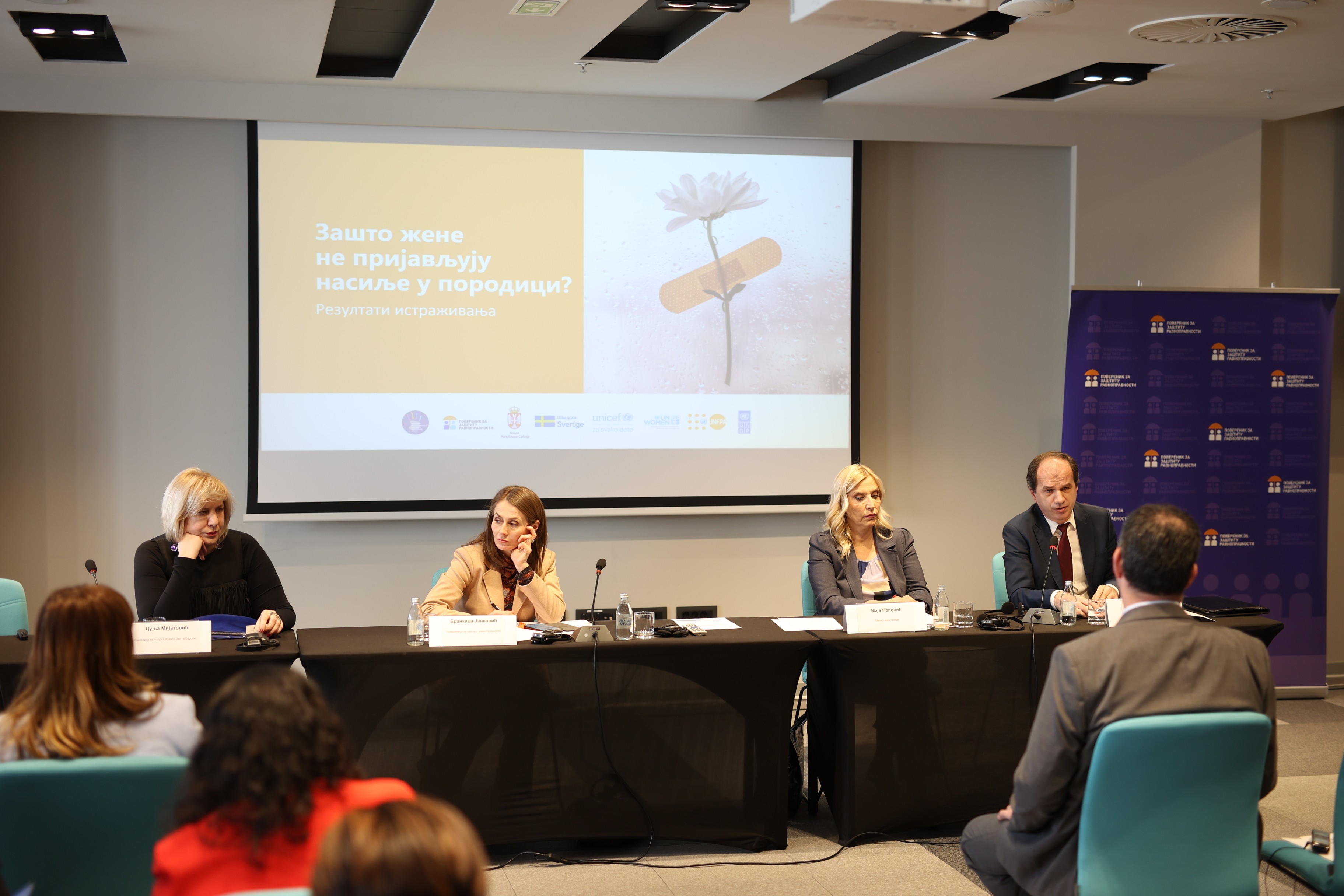Results of the research on the causes of insufficient reporting of domestic violence presented
Family’s support encourages women to report violence
March 16, 2023

Dunja Mijatović, Brankica Janković, Maja Popović and Yakup Beris
Belgrade, March 16, 2023 – Fear of the perpetrator, shame due to the experienced violence, fear of condemnation from those close to them, an unfavorable economic situation and distrust in institutions are the main reasons why women do not report domestic violence. What would encourage women to report violence is support from family and friends, institutions, as well as financial support. These are the findings of the research "Why do women not report domestic violence?", presented today by the institution of the Commissioner for the Protection of Equality and the United Nations Development Program (UNDP).
"The results of this research make it clear where the visible, but also invisible obstacles are. Women in Serbia predominantly do not justify domestic violence, but they believe that the problem of violence should first be solved within the family. That is why we as a society must create an environment in which being a survivor of violence does not imply stigma, condemnation or revictimization, but involves the support of everyone, from the closest family members to society as a whole", said Brankica Janković, Commissioner for the Protection of Equality.
"We must not allow women who have survived violence to remain without adequate economic and psychosocial support, which is why all institutions from the system of protection against violence must have a greater degree of cooperation and make additional efforts so that the citizens of Serbia gain greater trust in them", added Janković.
"For the effective prevention of gender-based and domestic violence, timely recognition, detection and reporting of violence are crucial. That is why, from the very beginning of the implementation of the Law on Prevention of Domestic Violence, the Ministry of Justice placed great emphasis on education and specialized training, attended by over a thousand participants - representatives of the judiciary, but also of other institutions responsible for the prevention of violence”, said the Minister of Justice Maja Popović.
Over 70% of women who lost their lives in partner and domestic violence had previously never reported it to institutions. The results of this research show us that the responsibility for reporting violence cannot lie solely on women," said Yakup Beris, Resident Representative of UNDP in Serbia, and added: "Institutions should respond to violence by taking into account the specific circumstances of individual cases, while families and local communities should recognize and better understand violence, in order to become the first line of support for survivors. At the same time, the media should report responsibly in order to avoid further traumatization of survivors, and to educate the public that domestic violence is a social and not a private problem.”
The research "Why do women not report domestic violence?" was conducted by the Center for Free Elections and Democracy (CeSID) from November 10 to December 5, 2022, on a representative sample of 1,004 women over the age of 18, including women facing multiple discrimination.
Of the total number of respondents, 35% have experienced some form of violence. 47% of them did not turn to any institution for support after the experienced violence, and 28% turned to someone from their personal environment.
When asked to state justified reasons for reporting violence, the largest percentage of women opted for serious physical injuries (73%), violence against children (64%), as well as threats of violence directed at them or family members (62%). Only 3% stated that in no case was it justified for a woman to report violence.
When it comes to protection from domestic violence, women have the most trust in safehouses, healthcare and the police, and the least in municipal free legal aid. Respondents also stated that if they experienced violence, they would first turn to family members (38%), the police (28%), and friends (9%).
This research was conducted within the project “Integrated Response to Violence against Women and Girls in Serbia III”, implemented jointly by UNICEF, UN Women, UNFPA and UNDP in partnership with the Government of the Republic of Serbia and with support of the Government of Sweden.

 Locations
Locations